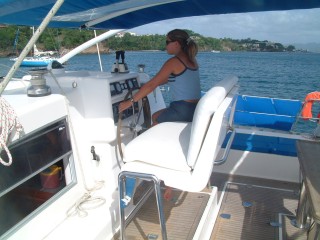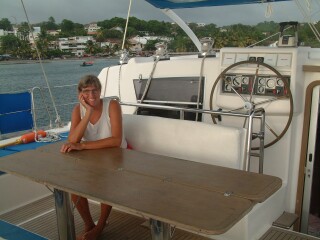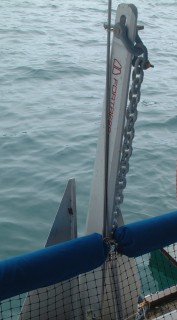
Amanda at Ocelot's helm, with the helm seat up
|
Top Level Ocelot Pages |
Cockpit Photos
 Amanda at Ocelot's helm, with the helm seat up |
Ocelot's cockpit has 2 personalities because our big helm seat pivots up and forward (when we're underway) or down and towards the cockpit table when we're at anchor. With the helm-seat up, as in the photo at left, we're in "underway" mode. The helm and all controls are within easy reach (although we usually let Otto the autopilot steer once we clear the harbor) and the instruments can be easily seen from anywhere on the helm seat. This configuration maximizes walking space in the cockpit and allows 3 adults to sit comfortably facing forward watching our progress (or even just reading or doing schoolwork).
Ocelot's cockpit is spacious without being overly huge. When sailing, three of us fit on the seat and there is still room at the table, aft, for eating, reading or playing chess! We like this size (which allows for a larger salon and interior) and the center-of-the-boat steering. Lots of French cats have 2 helms at the aft corners of the boat. This may be great for seeing sails and feeling the ocean better, but it's not so safe feeling for teens and loved ones on night-watch in a rough seaway!
 We spend a lot of time in the cool and airy cockpit |
Looking at the photo on the right, the wheel is leather coated stainless steel. The Whitlock gearing makes steering nice and easy. The black rectangles in front of it are the controls and gauges for the two 48hp Yanmar diesel engines. The 4 white squares just above them are covers for the sailing instruments: wind speed, wind direction, boat speed, water depth, fuel gauges, and autopilot controls. These are completely interfaced to each other as well as to the 2 Global Positioning Systems (GPS) and the computerized charting system inside.
With the helm seat flipped down, it makes another seat for the cockpit table. The table itself is hinged down the middle and folds in half when not in use. When unfolded, it opens up to seat about 7, and there's more lounging space on the cushions on either side of the cockpit. We tend to eat most of our meals in the cockpit.
The photo at left is quite old so some stuff has changed. Arthur's blue sandbox and the heavy ribbed-fiberglass liferaft cover aren't there anymore, nor is the window in the bimini. Our storm anchor now sits in custom chocks on the aft-deck (see below) and we've made new and much lighter covers over all 3 storage compartments. The center one is still used for the liferaft, and now the other 2 are used for fuel storage. But the photo shows the solar panels nicely, as well as the heavy-duty supports we put in to beef up the davits and solar panels. Now, even if a wave poops us an fills up the dinghy, the davits won't collapse. They also make nice hand holds when climbing up the sugar-scoops.
Our dinghy, an aluminum bottomed Rigid Inflatable Boat (RIB) named Tomcat, gets hoisted in the davits and nestles between the hulls just aft of the cockpit. For long or rough passages, our sailing dinghy, Nikka, nestles inside Tomcat. The solar panels sit nicely up on top of the davits, just aft of the traveler. The boom is usually pulled off to the side to give the solar panels more light. Each sugar-scoop sports a folding ladder for climbing out of the water, as well as a fresh-water shower hose to wash off the salt water. We also added the 4 grab-handles on the backs of the sugar-scoops, which make it much easier getting in and out of the dinghy.
 Our HUGE storm anchor is always ready to deploy. |
Sue and Amanda made the blue "lee cloths" just forward of the orange horseshoes. These give us some privacy and spray protection in the cockpit. They have also sewn side and aft flaps that attach to the bimini, providing the cockpit with great sun, wind, and rain protection. We usually take them down when underway.
Our storm-anchor, shown at right, is a mammoth Fortress FX-125. It's proof that some things should probably not be bought over the internet. A smaller anchor would have been more than adequate for Ocelot, but it's nice to have when storms are in the area. It sits in custom teak chocks just behind the cockpit with 2 buckets of chain, ready to deploy in a hurry if need be. This picture also shows the tubular cushions we made to go over the stainless steel bars that form the backrest for the cockpit table.
All 8 winches are 2-speed, stainless steel Andersen self-tailers and all lines are lead through Spinlock-type jammers. On the mast are 2 halyard winches which also handle the reefing lines. The main-sheet and main-vang/preventer each have their own dedicated winches just to the left of the helm. The 2 jib-sheet winches are on the corners of the main cabin. They also control jib roller system (although we usually just pull it in by hand) and the positioning of the jib-sheet fair-leads. The main-sheet traveler is on top of the targa bar, and it's controlled by 2 lines that come down to a winch at the base of the targa bar on port side. On the other side is the dinghy hoist winch from the davits.
Top Level: Home | Destinations | Cruising Info | Underwater | Boat Guests | Ocelot | Sue | Jon | Amanda | Chris | Site Map | Make a Comment
|
If our information is useful, you can help by making a donation |
Copyright © 2000‑ Contact: Jon and Sue Hacking -- HackingFamily.com, svOcelot.com. All rights reserved.